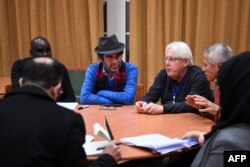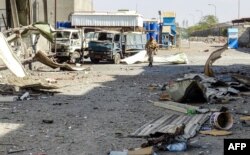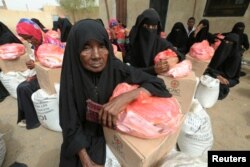The U.N. special envoy for Yemen on Wednesday gave the country's warring sides at peace talks under way in Sweden a draft agreement they need to consider before this round of negotiations wraps up the following day.
The document consists of a set of proposals, including one for a political framework for a post-war Yemen, the reopening of the airport in the capital, Sanaa, and a proposal for the contested Red Sea port city of Hodeida, a lifeline for millions of Yemenis dependent on international aid.
Hanan Elbadawi, spokeswoman for U.N. envoy Martin Griffiths, said he would await the "responses from the two parties before announcing the details of the set of agreements" at the end of talks Thursday.
The statement raised expectations for progress in the U.N.-sponsored talks in the town of Rimbo, Sweden, between Yemen's Iran-backed Houthi rebels and the government of President Abed Rabbo Mansour Hadi.
The government, which is supported by a Saudi-led coalition that has waged war against the Shi'ite Houthis, said the next round of negotiations could take place as early as January.
Civil war deaths
Meanwhile, an international group tracking Yemen's civil war reported that the conflict has killed more than 60,000 people, both combatants and civilians, since 2016.
The somber figure, which did not provide a breakdown of those killed, is much higher than the U.N. figure of 10,000 civilian deaths and adds to the urgency to find a resolution for the four-year bloodletting that has also left millions of Yemenis facing hunger.
In Rimbo, Yemen's Foreign Minister Khaled al-Yamani told The Associated Press that the venue for the next round of talks, likely at the end of January, hasn't been decided yet.
The U.N. draft proposal was not released to the media. A draft document obtained by the AP earlier this week showed an initial 16-point proposal to stop all fighting and have all troops withdraw to the city limits and later from the surrounding province, also called Hodeida.
In his interview with the AP, al-Yamani reiterated the government's stand on several points, saying that before a political framework for Yemen can be considered, "military and security arrangements" need to be in place.
The Houthis should hand over their arms, he added. "We cannot accept in Yemen a militia like the style of Hezbollah (in Lebanon) to survive within the state, and at the same time (to be) deciding the fate of their many people," he said.
On Hodeida, he said his side would only agree to a full rebel withdrawal while government forces would "reposition themselves into our barracks out of the outskirts of the city." A police force would then be set-up to patrol Hodeida, he said.
Hodeida proposals
Later Wednesday, a rebel delegate said his side accepts some of U.N. envoy Griffiths' proposals, specifically the one on Hodeida.
Abdul-Majid al-Hanash told reporters the rebels agree to halt all fighting in Hodeida, withdraw troops from the city and its port, and later also from the province, while allowing U.N. oversight and the setting up of a local administration.
Al-Hanash did not say where the rebels stand on the other points in Griffiths' proposed agreement.
The U.N. envoy has said he wants to "take Hodeida out of the war," in hopes that international aid delivers can be restored through the port and the country can avoid a full-out famine. About 70 percent of food aid and other imports are shipped through Hodeida's port, and reducing restrictions on aid organizations and fuel imports imposed by the Saudi-led coalition are vitally needed.
Humanitarian crisis
The war has made Yemen the world's worst humanitarian crisis, with 22 of its 29 million people in need of aid, according to the United Nations. The two sides have for months been locked in a stalemated fight over Hodeida.
The mounting humanitarian needs, and outrage over the killing of Saudi writer Jamal Khashoggi, have galvanized international support for ending the war. The United States, a backer for the Saudis, has called for a cease-fire and reduced some of its logistical aid for the Saudi-led coalition.
The new death toll figure of 60,000 for Yemen came from the U.S.-based Armed Conflict Location & Event Data Project, or ACLED, which said in a report Tuesday that more than 28,000 people — again both civilians and combatants — were killed in the first 11 months of 2018, an increase of 68 percent from 2017. More than 3,000 were killed in November, the deadliest month since ACLED started collecting data.
The group said 37 percent of the total number of civilians killed in Yemen in 2018 died in Hodeida.
The U.S.-based group said that it recorded more than 3,000 attacks on civilians, killing some 6,500, but that this figure does not include civilians killed in ground battles between the various sides.
ACLED's figures also do not include the last few months of 2014, when Yemen's Houthi rebels captured Sanaa and much of the country's north, nor the casualties in 2015, when the Saudi-led coalition joined the war on the side of Hadi's government.
ACLED bases its figures on press reports of each incident of violence in the war.







